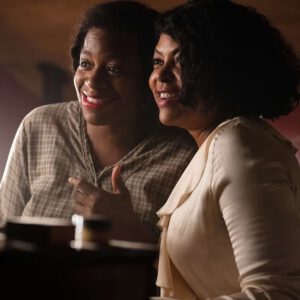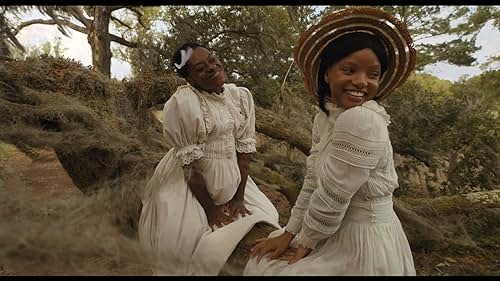Movie Info
Movie Info
- Director
- Samuel Bazawule
VP Content Ratings
- Violence
- 3/10
- Language
- 2/10
- Sex & Nudity
- 4/10
- Star Rating
Relevant Quotes
I have done what is just and right;
do not leave me to my oppressors.
Guarantee your servant’s well-being;
do not let the godless oppress me.
My eyes fail from watching for your salvation
and for the fulfillment of your righteous promise.
The people who walked in darkness/have seen a great light…
We know that all things work together[r] for good for those who love God, who are called according to his purpose.

Ghanaian filmmaker Samuel Bazawule brings to the screen this new version of Alice Walker’s classic novel of female empowerment. This time an adaptation of the Broadway musical, there are, of course, many differences from Steven Spielberg’s 1985 film. (It’s intriguing to note that Bazawule was just 3 years old back then!) That Spielberg and original star Whoopi Goldberg willingly pass on the torch to a new generation is seen by the fact that they are listed as producers of the new film—as is Quincy Jones, the original music director.
You will see that the film is indeed the product of a new age when you witness Celia and Shug kissing in a movie theater (in the balcony, of course) as an expression of their deep love for each other. This lesbian subtheme was only hinted at in the original, with the AIDs epidemic then still largely seen as a gay affliction (sent by God?) during that homophobic era. We can discern how much our times have changed by the fact that the film originally was awarded an “R” rting, but is now “PG-13.”
There are many other changes as well, including moving the location from landlocked northeastern Georgia to its seacoast. This permits some gorgeous shots of the cast dancing on a beach. The waves roll in, and the salt-bleached remains of a large tree spreads it branches overhead. Visually, this is a spectacularly beautiful film that goes well with the theme of supportive sisterhood.
Unlike the 1985 device, this script, credited to Marcus Gardley, Marsha Norman and Alice Walker, abandons the letters to God that Celia writes in the novel to express herself (and which forms the narrative for Spielberg’s film). In the new film much of this is expressed through the 17 songs. Although I did not find any of the songs to be showstoppers, they do indeed reveal to us what the characters are thinking and feeling at key moments, as in the opening song “Huckleberry Pie,” sung by the two sisters, Celie and Nettie (Phylicia Pearl Mpasi and Halle Bailey as the young Celia & Nettie, and Fantasia Barrino & Taraji P. Henson s the older sisters, respectively) as they play a game involving the clapping of their hands with each other.
In the original, we first heard the girls’ chanting voices over the front credits, the first image being a closeup of a purple flower. Then we see the two sisters playing in the midst of a large field filled with the flowers. In the new version they sit on the branch of the dead tree as they enjoy each other’s company. This merges into a church scene with the members singing “Mysterious Ways,” wherein the people praise God as they refer to “When the King threw Daniel into the lion’s den.”” In this and the story of Noah “When God saw the wicked,” “God works in mysterious ways.” The song obviously Thus, we are led to believe that in Celie and Nettie’s story he lso is working “in mysterious ways.” Repeatedly raped by her father “Pa” Alfonso (Deon Cole), Nettie gives birth (guess who plays the midwife? You’ll love this!), with the child being taken away from her. A local farmer known as Mister (Colan Domingo) fancies Nettie, the prettier of the two sisters, but sis forced by Pa to settle for Celie because he is desperate for someone to care for his wild kids and prepare the family meals.
Celie is thus treated like the slave she would have been a hundred and seventy years earlier, her body sold to a cruel man, forced to clean the filthy house and to try to tame the unruly children–all the while suffering physical and emotional abuse from the man she will only learn years later, is named Albert. Nettie, wanting to support her enslaved sister, visits her after Pa makes a sexual overture toher. Their companionship provides temporary relief, but Mister soon puts a stop to this, throwing her out into the rain one dark night. Nettie promises to write to her, but Mister always intercepts and hides the epistles, not even mentioning that her sister is trying to maintain contact. Much latter, upon discovering the cahe of purloined letters, Celie will learn that Nettie is living in Africa, even discovering that the two children adopted by the Black missionary Nettie is associated with are the two babies taken from her.
A parallel story is that of Mister’s oldest son Harpo (Corey Hawkins) who is drawn to the strong-willed Sofia (Danielle Brooks). She would never tolerate being treated like Celie, pushing back hard whenever Harpo tries to act like his father. Sofia’s bravado works fine in the African American community, but costs her dearly when she reacts negatively to the white mayor’s wife invitation, issued more as a command, to come and work for her as a maid. We see starkly how Jim Crow treatment can snuff out the inner light of even the strongest person. (Other than these two, they are the only whites we see in the film.) Darkness appears to have won out after all.

It is only with the arrival of Mister’s long-time mistress Shug Avery (Taraji P. Henson) that a ray of sunlight enters Celie’s dark world. Thanks to the accepted conventions of musicals, we accept the unrealistic of the whole “Negro” segment of the population dancing in the streets to celebrate the showgirl’s arrival—quite a number! Although ignoring her at first while attending to her lover, Shug eventually takes note of the woman meekly preparing her meals. They draw closer and closer as Shug helps her new friend with makeup and such. In one segment the two attend a movie, and while sitting up in the required balcony, they imagine themselves as part of a lavish Broadway dance ensemble. This is when we see them in the darkened theater kissing passionately.
If we look at Celie’s life up to this point as a Good Friday story, Shug is the one who brings Easter into her life, (In Scripture terms aptly foreshadowed by Isaiah 9, “The people who walked in darkness/have seen a great light”). Even apart from the Jim Crow cruelty of the white world, Celie has been victimized by racism’s twin form of darkness, patriarchalism, as exemplified by Mister. He buys her from her Pa as if she were an appliance, using her not only to cook meals and tend to his children, but also as an unwilling sex partner. He is as cruel and heedless of her feelings as any white man would have been. He means it when he says to her, “Whatever I say, go.” And he backs this up with his fists.
Sofia shows Celie that a woman can be strong, but then drops out of her life when she herself is imprisoned and years later, broken in spirit, is forced to serve the mayor’s wife. It is Shug who brings Easter into the girl’s life. She asks her, “How come you don’t laugh none? Ain’t you got something to make joy just smile?” All Celie can do is to mention her sister, whom has been taken from her. Nurturing her until at last Celie can fend for herself, we witness Celie’s spirit’s resurrection to point that she is almost wiling to kill to strike back at him in that suspenseful shaving scene.
Delivered from becoming a murderer, she confronts him in a better way at the dinner table where she defiantly confronts her tyrant, declaring, “It’s time I be free from you and then enter Creation.” Mister answers, “I’d die before I let that happen.” “Good,” she retorts, “That’s the going away present I’ve been needing.” Celie’s defiance at the family dinner is so surprising that the catatonic Sofia is brought back to life, causing ole Pa to use the term “resurrection” in his exclamation over Sofia suddenly speaking up at the table. Sofia laughs and then thanks Celia for the yeas of “checking in on me” when she was in jail. She credits her for her being able to survive those years of abuse.
Some of the changes in the new film are merely rearranging the order of the story—I kept wondering when Shug would lift her friend’s spirit and status by singing “Miss Celie’s Blues,” and when the singer herself would be reconciled to her harsh father, the Rev. Avery (David Alan Grier). The first now takes place at a birthday party when the two have left Mister so triumphantly; and the second, though not as showy with juke joint patrons joining with church members singing “God is Trying to Tell You Something,” is set in the church with just the father and daughter confronting each other in the song, a much quieter rconciliation but stll very moving.
The ending is softened a bit too, with Mister at first being turned down by Celie when he comes to realize the injustice he has inflicted on his vulnerable wife. She is still too hurt by his withholding of the letters from her sister to accept his apology. They are in the store that she now is able to own due to her unexpected inheritance*, and he buys a loud pair of pants as he lives. He then atones for his past by using his savings to enable Nettie and family, stranded in Africa for lack of papers, to return to Georgia . Their reunion is a glorious affair, with everyone decked out in their finest clothes, gathered around tables that form a large circle around a giant tree. The food set before them is worthy of the heavenly banquet that Jesus likens to the kingdom of heaven. And even Albert (Mister) is there, decked out in his garish trousers in honor of the occasion.
I like this new ending because of its inclusiveness—rather than watching Celie’s reunion from afar, Albert, with a renewed soul, is welcomed to the party. This is a film even more optimistic than the first, akin to the Gospel that declares that there is a place at the table for all who live in love and harmony with one another. It is such good news that our warring world needs to hear and see.
If you have read the novel, you can see that the snippet above from Psalm 119 could well be from one of Celie’s letters that she writes to God, allbeit with her grammar and spelling spruced up. Celie’s epistles, like many of the psalms, express her longings for comfort and rescue from oppression. Fortunately, she is brought into contact with the strong-willed Shug who is able to see the beauty in her that her Pa and Mister are blind to. As noted before, they regard her as no more than a utensil to be used and laid aside when not needed. Through her “Miss Celie’s Blues” Shug declares to her friend, “O sister, have I got news for you/ I’m something’/I hope you think/ That you’re somethin’ too.” Although I prefer Spielberg’s placement of the song in the juke joint where it changes the attitude of those who had looked down on Celie, it works well also in the smaller gathering of Celie’s birthday party. It is a touching example of sisterhood and how this bestows dignity and a sense of worth.
Shug, I think, also enlarges Celie’s sense of God and the beauty of God’s creation, Celie’s life being made so miserable by her Pa and Mister’s inhumane treatment that she could not see it. No one is likely to forget Shug’s statement to Celie, ““I think it pisses God off when you walk by the color purple in a field and don’t notice it,” a delightful blending of the vulgar with the holy for the sake of emphasis!
Do not let the new year go by without your seeing this celebration of the human spirit empowered by love, both human and divine!
*When Celie’s Pa dies Celie inherits the farm, the sale of which allows her to set up her own fabric and clothing shop—for me this is akin to Jesus’ promise, “The meek shall inherit the earth.” (Matt. 5:5)
Screen Rant offers an annotated list of the songs in the films that you will find helpful for thinking about and discussing this film. Just click on he title “The Color Purple Soundtrack Guide.” If you want to see the on-line text of the novel, click here.
Warner Bros.
This review will be in the December. Issue of VP along with a set of questions for reflection and/or discussion. If you have found reviews on this site helpful, please consider purchasing a subscription or individual issue in The Store.

